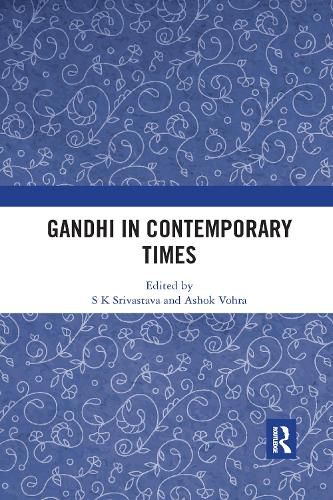Readings Newsletter
Become a Readings Member to make your shopping experience even easier.
Sign in or sign up for free!
You’re not far away from qualifying for FREE standard shipping within Australia
You’ve qualified for FREE standard shipping within Australia
The cart is loading…






This volume brings together essays that discuss and contextualise Gandhi’s ideas on pluralism, religious identity, non-violence, satyagraha, and modernity. It interrogates the epistemic foundations of Gandhian thinking and weltanschauung, identifies diverse strands within his arguments, and gives it new meaning in contemporary society.
This book focuses on Gandhi’s engagements with religious, political, and social conflicts; his reflections on faith and modernity; and his argumentative dialogues with Mohammad Ali Jinnah and B. R. Ambedkar. It provides critical insights into Gandhi’s philosophy and suggests ways of engaging with his ethical and moral ideas in contemporary intellectual and political discourse. Comparing and contrasting Gandhian thought and strategies with contemporary issues and conceptions of religious freedom, conflict resolution, and liberalism, the volume reformulates and reconstitutes his intellectual and political legacy.
This book points to new and possible future directions of research on Gandhian concepts and will be useful for scholars in the fields of political science, Gandhian studies, sociology, and philosophy.
$9.00 standard shipping within Australia
FREE standard shipping within Australia for orders over $100.00
Express & International shipping calculated at checkout
This volume brings together essays that discuss and contextualise Gandhi’s ideas on pluralism, religious identity, non-violence, satyagraha, and modernity. It interrogates the epistemic foundations of Gandhian thinking and weltanschauung, identifies diverse strands within his arguments, and gives it new meaning in contemporary society.
This book focuses on Gandhi’s engagements with religious, political, and social conflicts; his reflections on faith and modernity; and his argumentative dialogues with Mohammad Ali Jinnah and B. R. Ambedkar. It provides critical insights into Gandhi’s philosophy and suggests ways of engaging with his ethical and moral ideas in contemporary intellectual and political discourse. Comparing and contrasting Gandhian thought and strategies with contemporary issues and conceptions of religious freedom, conflict resolution, and liberalism, the volume reformulates and reconstitutes his intellectual and political legacy.
This book points to new and possible future directions of research on Gandhian concepts and will be useful for scholars in the fields of political science, Gandhian studies, sociology, and philosophy.